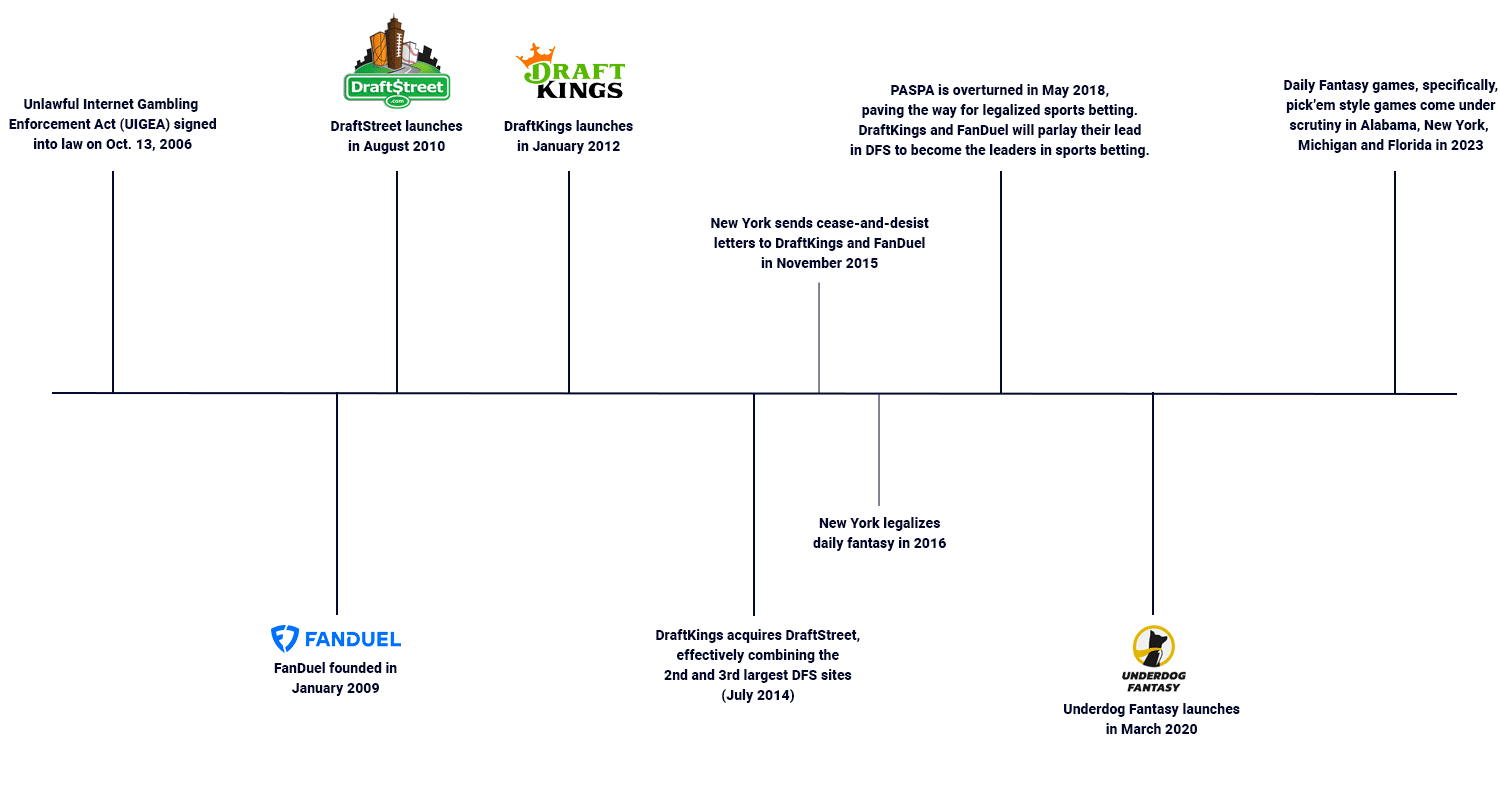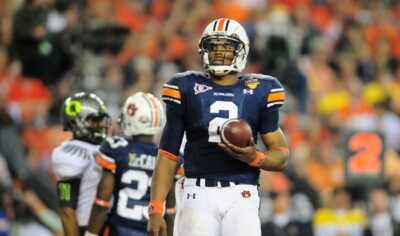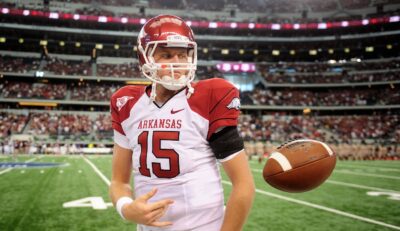Daily fantasy apps are widely used throughout the country, with all but five states not having some form of legalized DFS games.
But how did we get to this point and what is the future of daily fantasy sports legislation moving forward? Classifications for different types of DFS games are likely forthcoming with legal battles coming to a head in several states.
The landscape of daily fantasy sports is changing. More companies are striving for licenses throughout the country and questions remain about what actually constitutes a legal DFS offering and what falls too closely to sports betting.
History of DFS Legislation and Initial Pushback
Nearly all states in the country offer some type of DFS game, with only Nevada, Idaho, Hawaii, Montana, and Washington offering no DFS services whatsoever.
Prior to widespread DFS legislation, FanDuel and DraftKings dominated the U.S. market. According to the Wall Street Journal, in 2015 the two companies accounted for 95% of the U.S. DFS market. The two DFS companies operated in states for years without any necessary legislation regulating their actions.
However, a number of states began to push back against DFS offerings and these companies, declaring that DFS games were forms of gambling and in direct violation of the Professional and Amateur Sports Protection Act of 1992 (PASPA), which effectively outlawed sports betting throughout the country in all but a handful of states. Legislators in states hoping to ban DFS argued that fantasy sports games were actually forms of sports betting, believing that the elements of chance involved outweighed the elements of skill.
DFS operators have long contended that fantasy sports offerings are allowable under the Unlawful Internet Gambling Enforcement Act (UIGEA) and its carveout for games of skill. According to the Act, allowable events include those with outcomes that “reflect the relative knowledge and skill of the participants and are determined predominantly by accumulated statistical results of the performance of individuals (athletes in the case of sports events) in multiple real-world sporting or other events.”
One of the first states to push back against daily fantasy offerings was New York. The Empire State issued cease-and-desist letters to both FanDuel and DraftKings in November 2015, with the state’s attorney general, Eric Schneiderman, arguing that DFS was illegal under the eyes of the law as they should not be considered “games of skill.”
FanDuel and DraftKings pushed back, levying their own lawsuits against the state, and the battle waged in the courts until June 18, 2016, when the New York senate approved legislation to legalize DFS. The operators were ordered to pay a 15.5% tax, with DFS tax revenue benefiting New York Lottery’s education fund.
New York, however, was not the first state to legalize DFS in the country.

State Legalization of DFS
The first state to officially legalize DFS was Virginia in 2016. State legislators approved the “Fantasy Contests Act” (HB 775) on March 7, 2016, legalizing DFS offerings in the Old Dominion state. The bill defined fantasy contests as those that “include any online fantasy or simulated game or contest with an entry fee in which the value of all the prizes and awards offered to winning participants is established and made known to participants in advance of the contest.”
Licenses were set at a cost of $50,000 for operators.
Other states soon followed with their own legislation, with New York passing its own bill on June 18, 2016. As of March 2023, there were currently 15 licensed DFS operators in the Empire State.
New Jersey followed soon after, passing its own DFS bill in late 2017, with then Gov. Chris Christie (R) signed Assembly Bill A3532 into law. The bill defined fantasy sports activities as “contests in which the relative skill of the participants predominates to a degree that chance plays no material role in determining the outcome of the activities.”
Neighboring Pennsylvania passed its own bill on October 2017 when then Gov. Tom Wolf (D) signed HB 271 into law. The legislation was massive, not only legalizing DFS for the Keystone State, but also legalizing online poker and gambling as well. The bill set its licensing fee at $50,000 per operator and a tax rate of 15% of gross revenue.
By the end of 2017, 18 states had approved DFS gaming, with Ohio Gov. John Kasich (R) signing a bill in late December to become the final state to do so in the year.
Now, in 2023, 45 states offer at least some form of DFS for its residents, with only five states in the entire country (Nevada, Idaho, Hawaii, Montana, and Washington) not offering any type of DFS to its population.
But just because DFS is widespread does not mean the industry is without controversy. Companies have introduced new daily fantasy games that many professionals think border too closely to sports betting, an issue that is likely going to be decided in the courts.
New Breeds of DFS Games
Traditionally, DFS offerings have pitted customers against each other in draft-type competition, best ball offerings, or other games that typically involve drafting professional athletes and then competing against other users.
However, in the past several years new daily fantasy companies have begun offering a new type of fantasy sports competition, which has raised the ire of several of the more traditional operators that believe it hinges too close to actual sports betting.
Companies such as PrizePicks, Underdog Fantasy, and Betr offer daily fantasy sports games that resemble parlay-style, over-under type offerings where customers decide whether a combination of athletes will go over or under a certain statistical line set by the house. Unlike traditional fantasy games, these types of offerings do not pit customers against one another, but they pit them against the house.
In the past year, several operators have taken aim at these offerings, believing they too closely resemble sports betting and are being offered in states that do not have legalized sports betting. At the National Council of Legislators from Gaming States conference this past July, Cesar Fernandez, Head of State Government Relations, described the companies as illegal sportsbooks masquerading as fantasy sports operators.
“There are companies today posing as fantasy sports operators, and they are running illegal sportsbooks,” he said.
It was a direct shot at PrizePicks and Underdog Fantasy, which set off several months of public sniping and state regulators also having their say.
The Fight for DFS
Both Underdog Fantasy and PrizePicks have claimed their parlay-style, over-under type offerings fall under the Unlawful Internet Gambling Enforcement Act (UIGEA) carveout for games of skill. Jeremy Levine, founder and co-CEO of Underdog Fantasy, published a letter to the Underdog website defending his company’s offerings and decrying the efforts from FanDuel and DraftKings to declare the games as sports betting.
Levine argued that under the fantasy sports legal framework, a fantasy sports contest must have three core characteristics:
- A game based on skill
- Use predictions on two or more athletes from different teams
- Have the outcomes based upon those athletes’ accumulated statistics in real-world contests
“Every single one of our contests meets that simple definition. Fantasy sports is not limited to only FanDuel and DraftKings’ salary cap contests. The laws they wrote say fantasy sports is far broader than just salary cap. Equally important, in nearly every state where a sports betting law has been passed, the law makes crystal clear that fantasy sports are not sports betting. Explicitly, these laws state that if a contest is fantasy sports, it is therefore not sports betting,” Levine wrote.
FanDuel and DraftKings know their legal argument is wrong, Levine wrote.
“This isn’t a good-faith fight on the legal merits; it’s a convenient mask for a pure anti-competitive effort.”
I couldn’t be more excited about Underdog. BBM IV's the largest fantasy contest ever. Our Pick’em games are wildly popular. Our new vision for sports betting comes soon. @FanDuel & @DraftKings want to take all that away from you. You should know what they’re trying to do.
— Jeremy Levine (@JerLevine) August 9, 2023
Competition is the engine of innovation. FanDuel and DraftKings have been trying to limit competition in the DFS landscape, he wrote.
“You should not have to be stuck with the old fantasy sports games that FanDuel and DraftKings offer where the top few percent win a large majority of the money or old-fashioned casino sportsbooks. You should have the choice to play sports games that are fun and innovative. And you shouldn’t be limited to only the sports games offered by industry giants that are already focused on online casino gaming.”
But despite Levine’s protests, several states have taken action against the pick ’em offerings.
States Taking Notice of Player-Prop Style DFS Games
Several states have started to take aim at pick ’em DFS games, as some regulators are starting to say they too closely mimic sports betting events.
PrizePicks pulled out of both West Virginia and Maryland in 2022 when the states began to clamp down on their offerings, disallowing the pick ’em games for being too close to legalized sports betting.
But 2023 has also proven to be a difficult year for these DFS games, as a number of states have taken action against them as well. Wyoming regulators sent cease-and-desist letters to both PrizePicks and Underdog Fantasy in July, citing the pick ’em games fall under the definition of sports betting as defined by Wyoming statutes.
“‘Sports wagering’ means the business of accepting wagers from patrons on sporting events through online sports wagering. ‘Sports wagering’ wagers include single game bets, teaser bets, parlays, over-under, moneyline, pools, exchange wagering, in-game wagering, in-play bets, proposition bets and straight bets,” according to Wyoming’s sports betting statute.
Maine regulators also joined the party in August, as the Maine Gaming Control Unit sent a cease-and-desist letter to Underdog Fantasy regarding its pick ’em offerings. Representatives for Underdog said they will work with the regulators to continue operating in the state.
August proved to be a busy month for DFS operators, as both Underdog Fantasy and PrizePicks were forced to alter their offerings to Alabama customers due to a request from the Alabama Attorney General’s Office.
The two DFS operators can no longer offer their over/under type selections with individual athletes to customers. Both Underdog and PrizePicks are limited to offering Alabama customers their “combo” selections, which must include two or more athletes.
Customers in Alabama select between two to six of these “combo” boxes and play against the house, not other individuals like more traditional daily fantasy operators. Users in Alabama can no longer include squares with individual athletes in their selections. Customers must use the combo squares.
“We were glad to work with the Alabama Attorney General, who decisively interpreted the state’s daily fantasy sports law as allowing both peer-to-peer and our pick’em single-player fantasy contests. We’ve always maintained a fantasy sports license in the state, which the state has renewed multiple times. We’re continuing to offer pick’em with the Attorney General’s approval, with only relatively minor adjustments. We look forward to continuing to make our pick’em game and future game formats available to Alabamans,” said Nicholas Green, general counsel for Underdog Fantasy.
While these actions were troubling for DFS operators, they were taken in smaller markets. However, the largest markets in the country were also beginning to take action against the DFS offerings.
Massachusetts Examining All DFS Games
The Massachusetts Gaming Commission announced in August 2023 it would also be evaluating all DFS activity in the state in light of increased scrutiny throughout the country.
Massachusetts Gaming Commission Interim Executive Director Todd Grossman revealed the commission would begin a thorough review of all DFS operators and offerings in the state.
“There’s been a great deal of activity surrounding the boundaries of sports wagering and daily fantasy sports and whether there’s some overlap between the two. That is to say, whether there are certain activities offered by DFS operators that may be considered sports wagering activity. That’s been addressed in a number of jurisdictions now and has been discussed publicly. I wanted to note we are certainly aware of this issue and we’re in the process of reviewing it,” Grossman said.
Grossman did not provide any details on what the evaluation would entail or any timelines on when it would be completed.
No public findings have yet to be revealed.
Florida Takes Aim at DFS
The bad news continued for operators in 2023, as New York, Michigan, and Florida all took action to ban pick ’em games in their states.
The Florida Gaming Control Commission sent cease-and-desist letters to Underdog Fantasy, PrizePicks, and Betr in late September. Florida daily fantasy has always been a gray market, as the state has never legalized DFS but has allowed operators to offer games.
However, the commission sent letters to the three companies on Sept. 19, which in part read “betting or wagering on the result of contests of skill, such as sports betting, including fantasy sports betting, is strictly prohibited and constitutes a felony offense unless such activity is otherwise exempted by statute.”
The commission ordered the three companies to cease all of their fantasy sports offerings in the state. According to the three identical letters, which were signed by Louis Trombetta, executive director of the Florida Gaming Control Commission, fantasy sports betting is strictly prohibited under Florida law.
“Under Florida Law, betting or wagering on the results of skill, such as sports betting, including fantasy sports betting, is strictly prohibited and constitutes a felony offense unless such activity is otherwise exempted by statute.”
The letters go on to say that sports betting in the state may be only lawfully conducted pursuant to a gaming compact.
PrizePicks and Underdog Fantasy have continued to offer DFS in the state as they work through the process with the Florida Gaming Commission.
New York Slams Pick ‘Em Offerings
Just a few weeks later the New York State Gaming Commission approved DFS rules that seemingly ban the player-prop style DFS offerings in the Empire State. The Commission unanimously approved the state’s DFS rules, which do not include Pick Em’ style DFS games.
The Coalition for Fantasy Sports submitted a comment to the commission in favor of the Pick Em’ style DFS games, in which customers play against the house and make over-under type selections on a combination of statistical outcomes for athletes. Participants have control of their own skill-based roster selection, CFS wrote, that substantially determines the outcome of the contest.
PrizePicks customers also submitted more than 4,000 form-letters to the commission asking them to reconsider the ban of pick ’em in the state.
“We are meeting regularly with the NYGC to discuss the future of fantasy sports in New York. We are grateful for the advocacy efforts of our many members in the state and will work with policymakers to ensure that they can continue to play the fantasy sports they know and love,” a PrizePicks spokesperson said.
Despite the comments and letters, the gaming commission passed the proposed rules and banned the pick ’em style games.
The criteria for DFS games are clearly laid out in the rules.
“These would include statutory standards as well as a requirement that contests shall not be based on proposition betting and shall not have the effect of mimicking proposition betting. Contests in which a contestant chooses whether an individual athlete or a single team will surpass an identified statistical achievement would be prohibited,” a paragraph of the approved rules reads.
An Underdog Fantasy spokesperson said the company will continue to offer its pick ‘em games in New York at the present.
Michigan Approves Rules to Ban Pick ‘Em
Michigan became the most recent state to take action against DFS games that “mimic” proposition-style sports betting.
According to the Coalition for Fantasy Sports, a group representing PrizePicks, Underdog Fantasy, and Sleeper, Michigan DFS rules that ban the popular pick ‘em style games will likely soon go into effect.
The Coalition for Fantasy Sports reported in early October 2023 that the state Joint Committee on Administrative Rules (JCAR) took no action on proposed Michigan Gaming Control Board DFS rules during its 15-day consideration period. The inaction by the JCAR will automatically file the DFS rules with the Michigan Secretary of State where they will go into effect.
The Michigan Gaming Control Board proposed the DFS rules back in August. The rules prohibit the following regarding pick ‘em style games:
- “Proposition selection” means a fantasy contest player choosing whether an identified instance or statistical achievement will occur, will be achieved, or will be surpassed
- Proposition selection or fantasy contests that have the effect of mimicking proposition selection
- Any fantasy contests that involve, result in, or have the effect of mimicking betting on sports
The Coalition for Fantasy Sports decried the new rules and JCAR’s inaction to amend the rules. The coalition reported more than 2,600 emails were submitted protesting the new DFS rules by Michigan DFS customers and over 700 phone calls were placed to the committee.
“We will continue to work with regulators and policymakers to provide the innovative fantasy sports products customers want and love,” the coalition wrote in a prepared statement.
What’s Next for DFS Moving Forward?
States will likely continue to take action against DFS games they deem to be too close to sports betting, at least until the issue is potentially brought up in federal court. With so many states having varying rules on what actually constitutes a DFS offering, a higher court may have to eventually determine what constitutes a legal DFS game before it crosses over into sports betting territory.
Until federal action is taken, there will be far too many questions moving forward with DFS and DFS operators.
Robert is an expert on sports betting in the United States, specifically the legalization process and regulation surrounding the industry.






